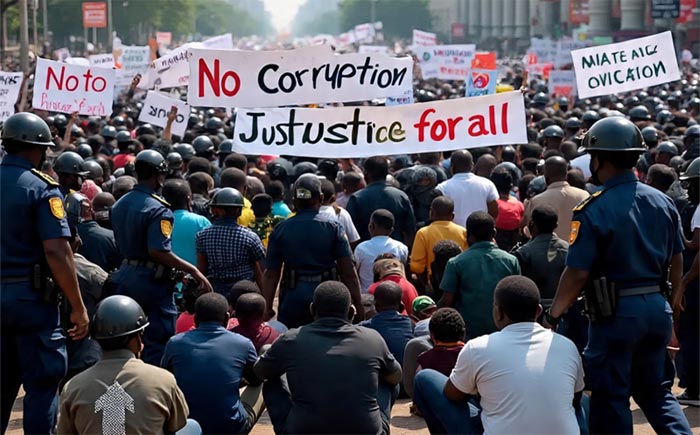
The Collapse of Trust: Unpacking Nigeria's Justice System Crisis. Imagine being a victim of a crime, only to see the perpetrator walk free because they have the money and influence to bribe their way out of trouble. Imagine waiting years for a case to be resolved, only to have it dragged out further due to inefficiency and corruption. This is the reality for many Nigerians, who have lost faith in a justice system that seems to favor the powerful and wealthy.
Corruption is a cancer that has eaten deep into Nigeria's justice system. Wealthy and influential individuals can bribe judges and prosecutors to influence case outcomes in their favor, creating an unequal justice system where the rich and powerful get preferential treatment. This is further exacerbated by the manipulation of case allocation, where court officials allocate cases to judges perceived as favorable to one side or the other.
The consequences of these corrupt practices are far-reaching. Justice is perverted, and the rule of law is undermined. The public loses faith in the system, and the legitimacy of the judiciary is eroded. The lack of accountability and transparency within the system makes it difficult to hold officials accountable for corrupt practices.
High-profile cases, such as Olisa Metuh's, create a perception that the powerful and wealthy can escape prosecution due to their influence and financial resources. This reinforces the notion that some individuals are above the law, and that justice is only served to those who cannot afford to buy their way out of trouble.
The lack of accountability for those in positions of power is a significant contributor to this perception. When those in power are not held accountable for their actions, it creates a culture of impunity, where individuals feel that they can act with reckless abandon without fear of consequences.
Delayed justice is another significant issue facing Nigeria's justice system. Lengthy court proceedings and unresolved cases lead to frustration among litigants and further erode trust in the system. The backlog of unresolved cases is a significant contributor to this problem, and the lack of resources and infrastructure within the justice system exacerbates the issue.
The consequences of delayed justice are far-reaching. Individuals and organizations are forced to wait for extended periods for cases to be resolved, leading to financial losses and emotional distress. The lack of timely justice also undermines the rule of law, as individuals begin to take matters into their own hands.
The lack of independence within Nigeria's judiciary is another significant issue. Judges may be compromised, leading to biased judgments and undermining the system's integrity. The executive branch's influence over the judiciary can also compromise its independence and impartiality.
The lack of independence within the judiciary is a significant contributor to the erosion of trust in the system. When judges are perceived as being influenced by external factors, it undermines the legitimacy of the judiciary and erodes trust in the system.
To restore trust in Nigeria's justice system, significant reforms are needed. Strengthening anti-corruption agencies and ensuring their independence is a critical step. Promoting transparency and accountability within the justice system is also essential, as is ensuring the independence and impartiality of the judiciary.
Addressing socio-economic inequality and promoting access to justice for all is also critical. This requires significant investment in the justice system, including infrastructure, personnel, and resources. It also requires a commitment to addressing the root causes of corruption and ensuring that those in positions of power are held accountable for their actions.
The collapse of trust in Nigeria's justice system is a significant issue that requires urgent attention. It is time for Nigerians to demand better from their leaders and institutions. It is time to hold those in power accountable for their actions. It is time to restore the integrity and independence of the judiciary. Only through these reforms can Nigeria's justice system be restored to its rightful place as a beacon of hope and justice for all.
Lagos, Nigeria.
+234 913 161 4181
+234 803 961 8550
+234 802 321 3873
info@pepperroom.com.ng
© 2025 | 🌶️Pepper-Room - Everything Loud, Wild, and Worth Talking About. | All Rights Reserved.
Pepper-Room is not responsible for the content of external sites.